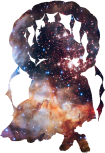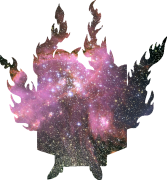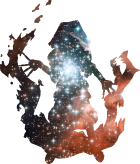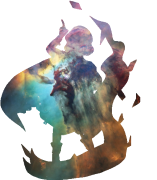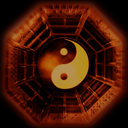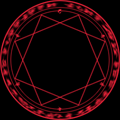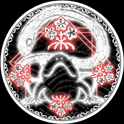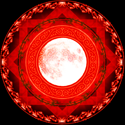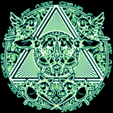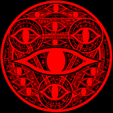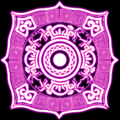The Esoteric in Touhou
Esoteric
adjective
”intended for or likely to be understood by only a small number of people with a specialized knowledge or interest.”
”designed for or understood by the specially initiated alone”
”spiritual knowledge that is believed to facilitate the spiritual change of an individual”
Have you ever taken a moment to think about why Touhou is so popular? What is it that has sustained people's interest for years, while many other media franchises have been abandoned? Is it the adorable cast of characters? The wonderful music? The unique, beautiful presentation? The satisfaction of mastering the gameplay? The vibrant community? ZUN's relaxed attitude towards fan works?
All of these undoubtedly contribute to the series enduring popularity, yet for many, it feels like there is something more to it all. After all, the characters can be as vicious as they are adorable. ZUN's music, art and writing has been as much criticized as praised. The gameplay can be repulsively difficult to people with no experience with danmaku games, and quite often Touhou games are the first introduction to the genre. The community is as much divided as it is united, large enough to form their own niches.
What exactly is it that makes Touhou endure? What is it that causes people to produce endless amounts of art, fan fiction and arrangements of ZUN's music? Is it perhaps some special quality that is difficult to put into words, a kind of quality you too perhaps felt when you for the first time actually played the games? A kind of otherworldly beauty that however has a bit of an edge, bit of danger and challenge about it? That special ”something” which causes people to describe Touhou as ”souled” or ”haunted” or ”divinely inspired”?
Did you perhaps start feeling that the characters are more than cardboard cutouts made to fit character tropes? Have you felt that they possess a certain sense of reality? Perhaps you started reading about them and found out that there is an amazing amount of very real history and mythology in Gensokyo. History and mythology that are tied to three religions and their associated philosophies that have shaped the culture of Japan – Shinto, Buddhism and Taoism.
Perhaps you familiarized yourself with the stories of the Hifuu Club and discovered the strange fringe science elements in there. Isn't it a bit strange how ZUN has felt the need to create an unusual metanarrative where people from the present day and the future discover the secrets behind Gensokyo and the Lunar Capital?
Did you ever ponder more deeply about ZUN's ideas regarding the Lunar Capital, the three-layered cosmology of the world of Touhou and his ideas surrounding the power of belief and things passing into fantasy? Did you feel like these hit a strange cultural undercurrent that has felt familiar but you have struggled to name?
Do you feel like there is something different about Touhou? How are people so compelled to create content surrounding it, compelled to adopt fabric idols, compelled to bring the characters to life with art, fangames and cosplay? That perhaps when people say it is ”souled” they may be more right than they would ever think?
And did you ever wonder what it is that ZUN meant by saying things like ”the characters decide when they want to appear” and ”there were even troublesome ones (characters) that seemed to move about on their own”?
The purpose of this document is to make a case that Touhou is a channeled, shamanic form of art that taps into something far greater, older and deeper than the imagination of a single man or even the collective imaginations of it’s fandom. Something that has the power to move with it’s own volition and to charm, persuade, bring together and even uplift people. Something that is more and more starting to constitute a kind of modern neo-mythology, a rebirth of something ancient.
The themes which are found below the surface of Touhou project, themes of liminalities, cycles, connections, order, chaos, renewal, change, archetypes, taking part in the co-creation of the world, the eternal return, travel to other realms, dealing with conflict and suffering, gods and monsters are the very same that form the core of many spiritual traditions and religions around the world. These traditions would often credit these themes as being something either divinely communicated or as kind of transcendental knowledge communicated by individuals who were exceptionally tuned into the nature of reality.
The history of the world is full of accidental shamans and people who were nominaly artists or entertainers but who managed to tap into something profound and communicate it forwards. Rare is the human mind that is like a clear mirror, and creative people always add their own color and interpretation to whatever inspires (literally ”breathes into”) them. All human perception is also projection, and creative people are less of a film camera for their sources of inspiration, and more like a kaleidoscope. Coming from a particular background of the otaku subculture and spending his youth in a country going through the ”occult boom” of the 1980s, ZUN has added his rather particular flair to whatever it is that he is acting as a channel for. This can make it easy to dismiss the presence of that something in Touhou, but once you become able to perceive it, all the puzzling features of the fandom and so many creative choices simply start to make so much more sense.
What is that ”something”, then? The way I see it, it’s something numinous, a spiritual quality that is intertwined with the material world, but also transcends the conventional human understanding of time and space. It encompasses the divine and the monstrous, the friendly and troublesome, the lovable and the terrifying. They are ever-present, but most commonly hidden, making themselves known only in extraordinary circumstances, to peculiar people or to those who seek them and call out to them. And sometimes, people who have a certain sensitivity or openness and who seek out their traces in the world, those stories of gods and monsters, can come face to face with them. Our language might have lost ability to fully conceptualize it, but it is them who can truly inspire – breath into – us. When they become manifest, they herald to us that there is more to the world than we thought and invite us to seek the answers and tell the stories.
In Japanese culture, there are traditional terms for such a power and it’s awe or fear-inducing manifestations: kami and youkai, two favorite subjects of Touhou’s fiction. Buddhism added to these categories with the idea of the transcendental awakened ones, buddhas, and the boddhisattvas, awakening-beings who delay their final transcendence from cycles of death and rebirth in order to help other sentient beings.
I believe it is these forces that operate through ZUN.
I am not the first one to make claims along these lines, and the spiritual qualities of Touhou were observed by some as early as the late 00’s. Many in the fandom have had sneaking suspicions about there being more to Touhou than the eye meets, and this has mostly manifested in half-jokes regarding ZUN being contacted by inhabitants of Gensokyo. The truth is something like that, but much more stranger and complex, something that challenges conventional Western materialistic notions about the nature of reality. This document is simply the largest, most coherent known Western attempt at presenting the case for the esoteric in Touhou and exploring it’s full implications.
Structure of this document
Part 1 presents the influence of Shinto, Buddhism and Taoism and how they intermingled to shape Japanese culture and by extension Touhou. While this is not a complete representation of every idea or reference in the world of Touhou, it paints a picture of ZUN's deep interest in these three religions and traditions that have shaped Japan. The spiritual history of Japan is one of the struggle between core and periphery, and ideas, beliefs and deities constantly escaping the confines of state-aligned orthodoxy. The rich shamanic traditions, some of them persisting to this day, ensured that the spirit world could be accessed by those outside of the core power structures. The spiritual history of Japan is also one of men and monsters, people who helped to shape the traditions, and the dark side of the numinous, the ”strange apparitions” that lurked in the night. These aspects too are referenced to in Touhou.
Part 2 explores the influence of Western esotericism and fringe science and paranormal theories on Touhou. In Japanese culture, these would be rolled under the term occult, ”okaruto”, and ZUN would have lived his early youth in the 1980s when there was a huge boom in interest towards these topics. Beyond the influence of the mythologies and beliefs of his native land, ZUN appears to have an interest in various fringe ideas that have come from elsewhere. Part 2 also explores some of ZUN’s more original ideas, such as his particular take on tripartite cosmologies.
Parts 1 and 2 are meant not only to explore the cultural context which influenced Touhou, but also to introduce certain ideas from both tradition and the fringes of science that support the existence of spirits, non-human inteligences, or whatever labels one might want to place them. I find it deeply fascinating that references to these things are baked into the lore and worldbuilding of Touhou, almost as a kind of trail of breadcrumbs.
Part 3 introduces the idea of Touhou as a souled entity, or as a host of entities. It begins with an exploration of Touhou as an egregore. Touhou is undeniably such a thing in at least the more cultural-memetic definition of the word, an autonomous cultural entity that has taken on a life of its own. This section also explores connections Touhou has to real-life locations, many of them sacred places. In particular, the franchise has many connections to Nagano, where ZUN lived his childhood. Furthermore, this section explores the idea that the connections Touhou has to real life traditions and places have generated Genokyo into a spirit world of it’s own, and that spirits have taken up a wide variety of different manifestations historicaly.
In part 4 we explore putting ideas from the spiritual traditions from Touhou into practice. These include setting the right expectations for practice, some issues you might run into, and how to work on your baseline life situation to help you get better outcomes from spiritual practice. We also explore the similarities between the act of playing Touhou games and certain forms of spiritual practice.
I believe the three spiritual traditions presented in the games offer immensely powerful tools for self-development, personal growth and reconnecting to the surrounding world. The critical treatment of established religions in Touhou also makes us aware of the pitfalls associated with them and helps us avoid such.
These texts are not meant to be set in stone, and will be updated and rectified when necessary. They are not meant to be some sort of dogma or final statement. This is as much an exercise in organizing my own findings and thoughts as it is a way to share these findings. I am still very much learning and growing. I strongly encourage you to explore these topics on your own and to form your own opinions. I hope this is a dialogue and not a monologue. And for a handful of self-selecting few this will be the start of a transformative journey.
Every journey, transformative or not-so-transformative begins with a single step, and here, it shall be the exploration of Japanese spiritual traditions, mythology and history that inspired ZUN.
